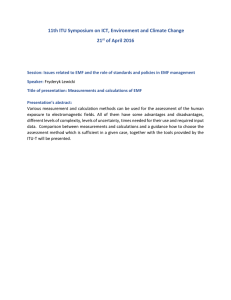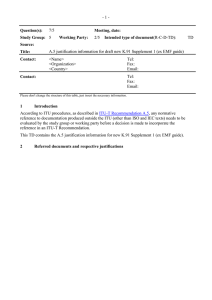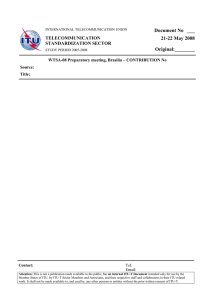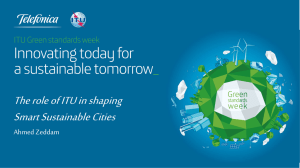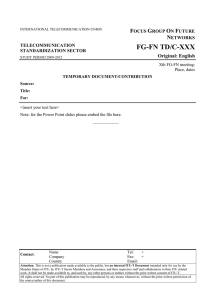With ICTs everywhere, how safe is EMF? Guy-Michel KOUAKOU
advertisement
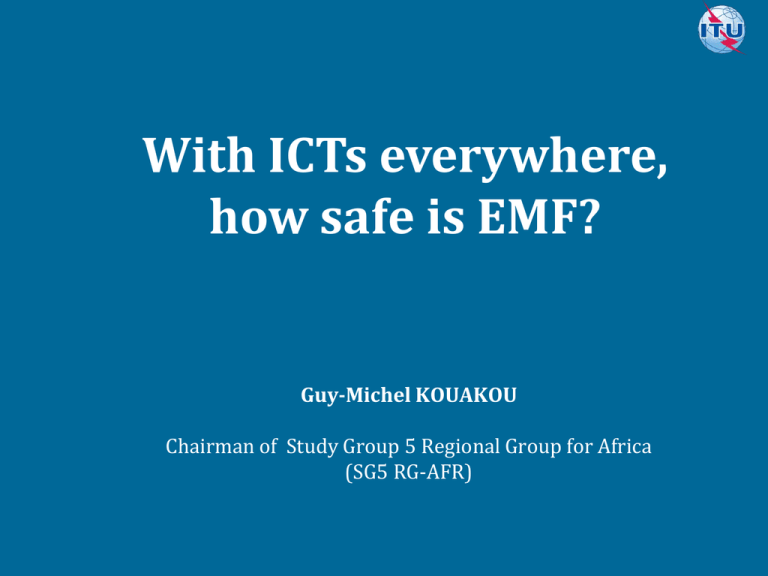
With ICTs everywhere, how safe is EMF? Guy-Michel KOUAKOU Chairman of Study Group 5 Regional Group for Africa (SG5 RG-AFR) Committed to connecting the world The issue… The electromagnetic electromagnetic fields are unknown and undetectable undetectable for for people… people… In some countries, Lack of regulation there is lack of regulation and/or and/or non-compliance... non-compliance... There isLack a clear of lack of communication and information to citizens… It can generate a lack of trust, which may become fear… Committed to connecting the world ITU-T’s mandate on EMF ITU-T Resolution 72 “Measurement concerns related to human exposure to electromagnetic fields” World Telecommunication Standardization Assembly (Rev. Dubai, 2012) Committed to connecting the world Regulation of non-ionizing radiations Exposure standards: Specifications that limit the exposure of people to the Electromagnetic fields (EMF) Emission standards: Specifications that limit the emission of electromagnetic fields (EMF) from the devices Committed to connecting the world How can global standards help… Facilitate compliance with international standards Strengthen collaboration among stakeholders Ensure transparency Enhance communication with citizens Committed to connecting the world ITU-T Study Group 5 Lead study group for: electromagnetic compatibility and electromagnetic effects 7 Questions WP1/5 Damage prevention and safety WP3/5 ICT and climate change 5 Questions WP2/5 Electromagnetic fields: emission, immunity and human exposure 6 Questions Q7/5 Human exposure to electromagnetic fields (EMFs) due to radio systems and mobile equipment Committed to connecting the world Question 7/5 Human exposure to electromagnetic fields (EMFs) due to radio systems and mobile equipment Main Study Area: Real site measurements and modeling of the multiple sources operating on different frequencies and transmitting antennas; Determine the validity of electromagnetic field predictions; Procedures and guidance on numerical modeling of EMFs in the areas around telecommunication transmitting antennas and various systems; Guidance based on existing SAR measuring and calculating procedures, techniques and protocols for evaluating EMF due to ICT equipment; Handbook to answer frequently questions about human exposure to EMF. Committed to connecting the world Question 7/5 Human exposure to electromagnetic fields (EMFs) due to radio systems and mobile equipment Main Tasks: Develop Recommendations for the telecommunication sector; Implement the mandate of the ITU Resolutions on EMF; Collaboration with other standardization bodies (IEC, CENELEC, WHO) in order to avoid duplication of work; Maintenance and enhancement of the existing Recommendations. Committed to connecting the world Typical EMF assessment Safety EMF compliance at sites Occupational Health & Safety (OH&S) for workers and public Environmental Radio signals in the community Educational & informative Committed to connecting the world EMF assessment methods Calculations or measurements? EMF assessment method depends on site & environment Calculations - suitable in many cases, & have significant benefits accurate, fast & cost effective Measurements - required in very complex environments Field monitoring Field monitoring is effective when working on towers for safety Field surveys can provide public reassurance Continuous monitoring – limited long term benefit where EMF levels are low and stable ITU-T Recommendations - guidance on both calculation and measurements Committed to connecting the world ITU-T Recommendations for EMF assessment ITU-T K.91 Guidance for assessment, evaluation and monitoring of human exposure to radio frequency electromagnetic fields ITU-T K.83 Monitoring of electromagnetic field levels ITU-T K.70 Mitigation techniques to limit human exposure to EMFs in the vicinity of radiocommunication stations – includes EMF Estimator software ITU-T K.52 Guidance on complying with limits for human exposure to electromagnetic fields ITU-T K.61 Guidance on measurement and numerical prediction of electromagnetic fields for compliance with human exposure limits for telecommunication installations Committed to connecting the world Highlights on deliverables ITU-T K.91 provides guidance on how to assess and monitor human exposure to radio frequency (RF) electromagnetic fields (EMF) in areas with surrounding radio communication installations based on existing exposure and compliance standards, based on existing exposure and compliance standards in the frequency range of 9 kHz to 300 GHz; includes advantages and disadvantages of methods. Committed to connecting the world Highlights on deliverables - continued ITU-T K.83 provides guidance on how to make long-term measurements and monitoring of EMF in the selected areas that are under public concern, in order to show that EMFs are under control and under the limits; Implementation of Recommendation ITU-T K.83 "Monitoring of electromagnetic field levels" in countries (e.g. Argentina, Brazil, Colombia, Ecuador and El Salvador, ect). Committed to connecting the world Highlights on deliverables - continued ITU-T K. 70 defines techniques which may be used by telecommunication operators to evaluate the cumulative (total) exposure ratio in the vicinity of transmitting antennas and to identify the main source of radiation; Provides guidance on mitigation methods which allow reduction of radiation level; Provides guidance on procedures necessary in the environment (on site) in which, in most cases, there is a simultaneous exposure to multiple frequencies from many different sources; Includes a software provided that implements the methodology: EMF estimator Committed to connecting the world Highlights on deliverables - continued ITU-T K. 52 aims to help with compliance with safety limits for human exposure to EMFs; Provides guidance on calculation method, and installation assessment procedure; Is based on safety limits provided by ICNIRP; Determines the likelihood of installation compliance based on accessibility criteria, antenna properties and emitter power; Recommends IEC Standard for the compliance measurement of mobile handsets. Committed to connecting the world Highlights on deliverables - continued ITU-T K. 61 helps telecommunication operators to verify compliance with exposure standards promulgated by local or national authorities; Provides guidance on measurement methods that can be used to achieve a compliance assessment; Provides guidance on the selection of numerical methods suitable for exposure prediction in various situations. Antenna Reflecting wall no reflection direct reflection Reflecting surface Committed to connecting the world K.61_F02 Deliverables under study ITU-T K.mpis - Measurement of radio frequency electromagnetic fields to determine compliance with human exposure limits when a base station is put into service Application on EMF Guide provides information on EMF in a user friendly manner – available for smartphones, laptops, tablets, etc. Information guide on human exposure to EMF answers to typical questions asked by the public on EMF, and to address typical misunderstandings on EMF matters in the society Committed to connecting the world EMF flyer and website Committed to connecting the world Purpose of ITU-T’s activities EMF Safety Important to assess EMF compliance at sites Important to establish Occupational Health & Safety (OH&S) procedures Environmental Educational and informative Calculation vs monitoring – a balance is needed Effective Public Communications Committed to connecting the world ITU-T’s vision “The rational solution to citizens’ concerns regarding exposure to EMFs is to ensure that the actions of national regulators and network operators are accompanied to the greatest possible extent by transparency and communication with citizens. Malcolm Johnson, ITU/TSB Director Compliance with international standards and associated reporting mechanisms assures citizens that regulators and network operators have complied with international best practices in deploying base stations, thereby safeguarding citizens’ health.” Committed to connecting the world Forthcoming events Meeting of ITU-T SG5 Working Party 1 and Working Party 2 23-29 July 2014, Geneva, Switzerland Forum on "EMF - What does it really mean?“ 4 September 2014, Santo Domingo, Dominican Republic 4th ITU Green Standards Week 22-26 September 2014, Beijing, China Committed to connecting the world Additional information ITU-T/SG5 “Environment & Climate Change” itu.int/go/tsg5 ITU-T/SG5 Series K Recommendations (free of charge) itu.int/ITU-T/recommendations/index_sg.aspx?sg=5 ITU and EMF itu.int/go/emfs THANK YOU! tsbsg5@itu.int Committed to connecting the world
